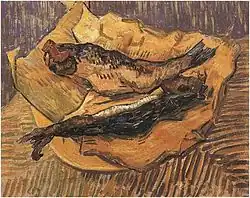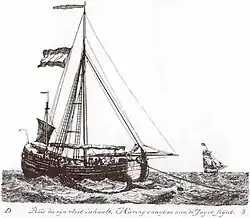Bloater (herring)

Bloaters, a type of whole cold-smoked herring, are "salted and lightly smoked without gutting, giving them a characteristic slightly gamey flavour".[1][2] They have a particular association with Great Yarmouth, England.[3][4] Though popular in the 19th and early-20th centuries, the food has become rare.[5][6] Bloaters are sometimes called Yarmouth bloaters, although production of the product in Yarmouth appears to have now ceased in the town with the closure of its smoked-fish factory in 2018. The bloater is also sometimes jokingly referred to as a Yarmouth capon, a two-eyed steak, or a Billingsgate pheasant (after the Billingsgate Fish Market in London).[7][8][9][10]
The bloater is associated with England, while kippers share an association with Scotland and the Isle of Man (the Manx kipper). Bloaters are "salted less and smoked for a shorter time", while kippers are "lightly salted and smoked overnight"; the preparation of red herring features more salt and a longer smoking-time.[11][12]
Terminology
The name "bloater" most likely arises from the swelled or "bloated" appearance the fish assumes during preparation,[13] while at least one source attributes it to the Swedish word "blöta", meaning to wet, soak, or impregnate with liquid (as in soaking in brine).[14]
Bloaters, bucklings and kippers
All three are types of smoked herring. Bloaters are cold-smoked whole; bucklings are hot-smoked whole; kippers are split, gutted and then cold-smoked.
See also
- Fish preservation
- Herring as food
- List of dried foods
- List of smoked foods
- Red herring, a term for an irrelevant distraction
- Smoked fish
- Solomon Gundy
References
- ^ Mason, Laura (2004). Food Culture in Great Britain. Greenwood Publishing Group. p. 80.
[...] the Yarmouth bloater [...]; these are salted and lightly smoked without gutting, giving them a characteristic slightly gamey flavor.
- ^ Fearnley-Whittingstall, Hugh; Fisher, Nick (2007). The River Cottage Fish Book. Bloomsbury. p. 168.
BLOATERS[:] Lightly cold-smoked whole herrings, which have a slightly gamey flavour because they are ungutted.
- ^ Mason, Laura (2004). Food Culture in Great Britain. Greenwood Publishing Group. p. 80.
- ^ Fearnley-Whittingstall, Hugh; Fisher, Nick (2007). The River Cottage Fish Book. Bloomsbury. p. 168.
Great Yarmouth has long been famous for its bloaters.
- ^ Mason, Laura (2004). Food Culture in Great Britain. Greenwood Publishing Group. p. 80.
Another herring cure popular during the nineteenth and early twentieth centuries, but now rare, was the Yarmouth bloater (from Great Yarmouth on the east coast) [...].
- ^ Fearnley-Whittingstall, Hugh; Fisher, Nick (2007). The River Cottage Fish Book. Bloomsbury. p. 168.
- ^ Barrère, Albert; Leland, Charles Godfrey (1889). A Dictionary of Slang, Jargon & Cant. Vol. 1. Ballantyne Press. p. 21.
- ^ Barrère, Albert; Leland, Charles Godfrey (1897). A Dictionary of Slang, Jargon & Cant. Vol. 2. G. Bell. p. 373.
- ^ Hotten, John Camden (1874). Slang Dictionary: Etymological, Historical, and Anecdotal. Chatto and Windus. p. 332.
- ^ Morris, William; Morris, Mary (1988). Morris Dictionary of Word and Phrase Origins. HarperCollins. p. 62.
- ^ Bender, David A. (29 January 2009). A Dictionary of Food and Nutrition (3 ed.). Oxford University Press. p. 256. ISBN 9780191579752.
Herring, red [...] Herrings that have been well salted and smoked for about ten days. Bloaters are salted less and smoked for a shorter time; [...] kippers lightly salted and smoked overnight. Also called Yarmouth bloaters.
- ^ "Isle of Man: Nature: Get Kippered". BBC. 27 April 2008. Retrieved 30 March 2011.
- ^ Partridge, Eric (1983). Origins: a short etymological dictionary of modern English (1983 ed.). New York: Greenwich House. p. 50. ISBN 0-517-41425-2.
- ^ "Bloater". Rigby’s Encyclopaedia of the Herring. Graeme Philip Rigby. 2018. Retrieved 12 June 2023.

